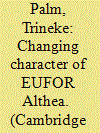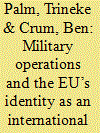| Srl | Item |
| 1 |
ID:
155807


|
|
|
|
|
| Summary/Abstract |
States have different strategic cultures when it comes to legitimating the use of military force and its relation with other foreign policy instruments. However, increasingly, military operations are conducted in multilateral forums; EU military operations are one of the most notable examples of this development. While some claim that these operations reflect power relations between nations with different strategic cultures, others argue that these common missions involve states in a process of collective learning and convergence of interests. Drawing upon an advocacy coalition approach, this paper confronts the competing hypotheses in the case of European Union Force (EUFOR) Althea in Bosnia-Herzegovina (BiH), as the EU’s longest running military operation (since 2004). On the basis of policy documents and semi-structured interviews with policymakers and politicians, this paper concludes that the evolution of EUFOR Althea has been primarily the result of the power politics of different coalitions, but there have also been a few instances of learning.
|
|
|
|
|
|
|
|
|
|
|
|
|
|
|
|
| 2 |
ID:
168968


|
|
|
|
|
| Summary/Abstract |
For long, its lack of military means served to single the European Union out as a “civilian” or “normative power”. However, since 2003 twelve EU military operations have been launched. On the basis of a comprehensive analysis of all EU military mission so far, this article seeks to establish how these missions have evolved over time and how they have affected the character of the EU as an international actor. For this purpose, the article outlines four ideal-typical conceptions of the EU's international identity and operationalises them along two underlying dimensions: justification (the purpose of military operations) and policy-embeddedness (the coordination between military means and other foreign policy instruments). Analysing the military operations along these two axes, the article suggests that the EU has been evolving towards a “Liberal Power” identity, as is reflected in a shift from value-based to utility-based justifications, while military operations have at the same time become more embedded in the EU's overall foreign policies.
|
|
|
|
|
|
|
|
|
|
|
|
|
|
|
|